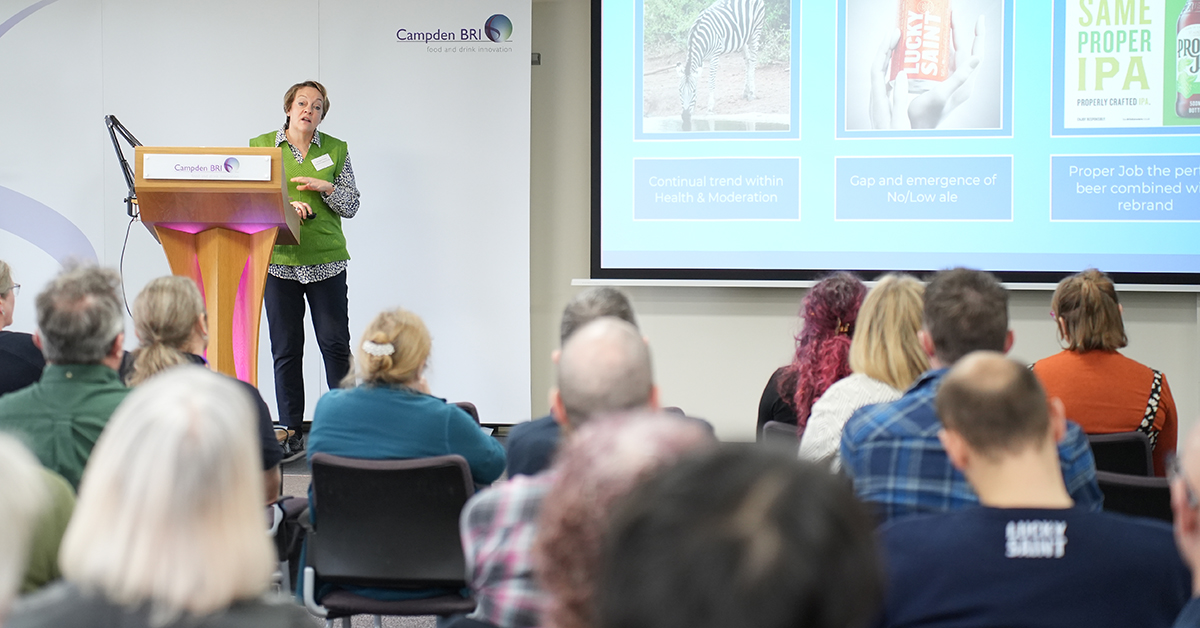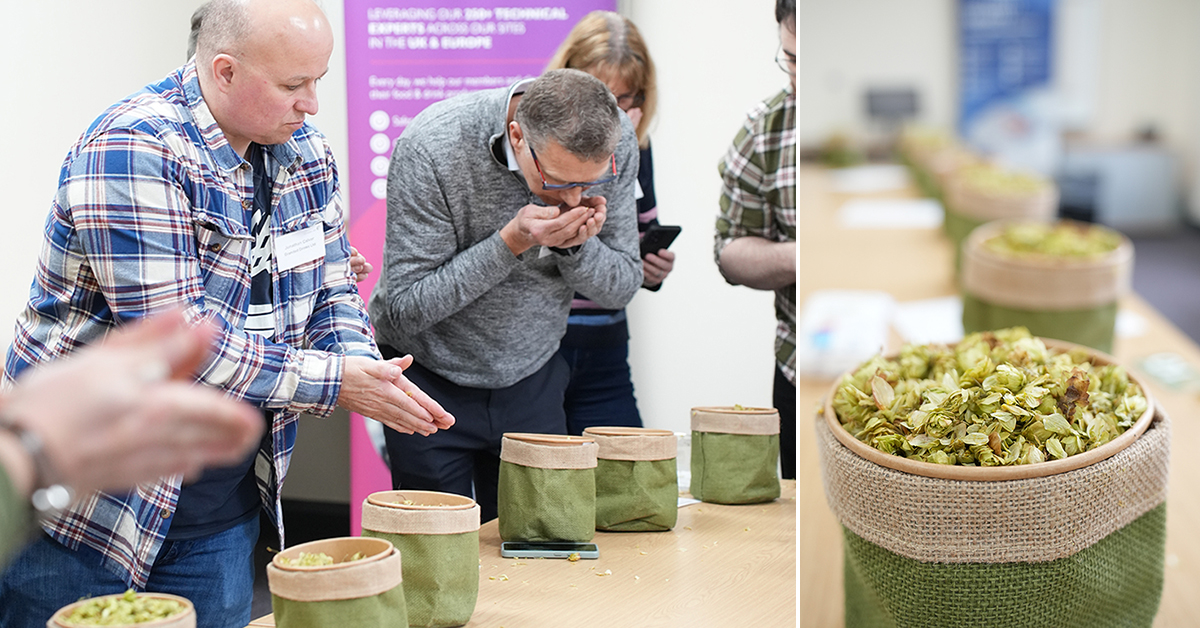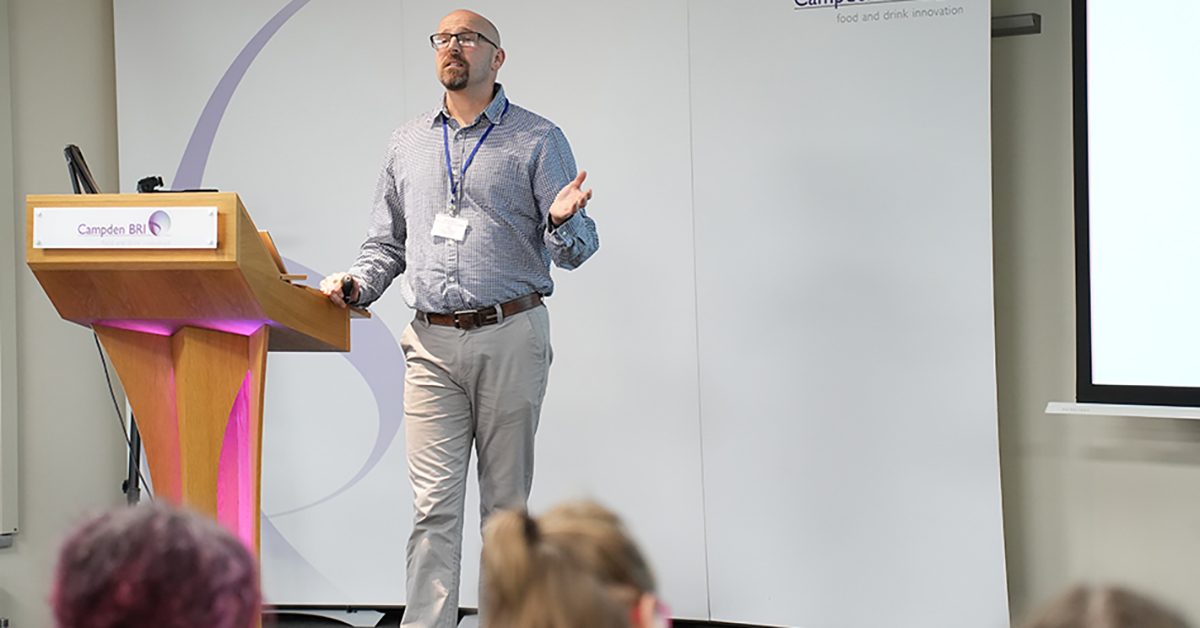
Insights from our Brewers’ Day event
11 February 2025 | Emma Hanby, Associate Director - Technology and Research Consulting
On the 28 January, we hosted our Brewers’ Day event, welcoming member delegates from across the brewing sector. Our member-only event, held in collaboration with the British Beer and Pub Association (BBPA), brought together a diverse group of experts to explore emerging trends and key challenges within the industry.
Campden BRI, is a dedicated partner to brewers, providing ongoing support in regulatory matters, brewing microbiology and industry research. The event offered a valuable insight into key issues affecting the brewing sector including regulatory updates, risks, resilience, sustainability and no/low alcohol beverages.
Highlights from the event
The day began with a welcome and introduction from Campden BRI’s CEO Peter Headridge, before handing over to our chair for the day Steve Livens, Policy Manager at BBPA, who introduced each speaker with a summary of their industry background.
The Brewer’s perspective
Brewing sector state of Union
Emma McClarkin, chief executive of BBPA
Emma McClarkin started the presentation sessions by offering an overview of the state of the brewing sector. As a former Member of the European Parliament, Emma discussed ongoing challenges like Brexit and the cost-of-living crisis.
Despite a slow recovery in consumer confidence, beer remains a popular beverage, and the market for low/no-alcohol varieties has steadily grown over the past decade. Emma noted that one emerging challenge is the need for more low/no-alcohol options on draft. She also emphasised the importance of decarbonising operations and building resilience to flooding and changing environmental conditions.
Emma concluded by acknowledging the valuable insights Campden BRI provides to the brewing industry, supporting brewers with regulatory and research needs.
Sector risks, priorities, and opportunities
Kath Dunbar, global director of science and regulatory affairs at AB-InBev
Kath Dunbar’s presentation focused on AB-InBev’s core principles: transparency, food safety, and consumer awareness. She highlighted the company's commitment to voluntarily labelling all products, even when not legally required, to ensure consumers have detailed information on ingredients.
Kath discussed the brewing industry's biggest risks, such as the importance of accurate food safety and allergen labelling and the growing threat of food fraud. She also explored the expansion of low/no-alcohol markets, navigating Brexit’s complexities, and the potential of novel ingredients.
Kath wrapped up her presentation by stressing the need for more consumer education about beer’s rich heritage.
Proper job 0.5%
Georgina Young, brewing director at St Austell Brewery
Georgina Young shared the story behind St Austell Brewery’s low-alcohol beer ‘Proper Job 0.5%’. She explained how the brewery developed this product in response to the growing trend of health-conscious consumers. The process involved using a special yeast to produce a low-alcohol version while retaining the bold flavours of the original IPA.
Extensive testing followed, including blind taste tests, which showed promising results, and the next step is to launch the product on draught. Georgina highlighted how innovation can meet consumer demand without compromising on brand integrity.

Hops and malting: a review of threats and opportunities
Climate risk and resilience in brewing
Bob Gordon, Director of the Zero Carbon Forum
Following a brief pause for a break and a chance for delegates to network, Bob Gordon led a session focused on the climate risks impacting hop and barley production.
Bob introduced a cross-industry project sponsored by The Workshipful Company of Brewers to assess how extreme weather conditions are affecting the production of hops and barley. The project consists of three phases: identifying material climate risks, assessing physical risks based on data, and exploring solutions, such as regenerative practices to improve soil health. Bob also emphasised the growing concern about climate change’s impact on crop yields and the brewing industry’s future.
The UK hop industry
Paul Corbett, managing director of Charles Faram
Keeping with the climatic theme, Paul Corbett provided an update on the UK hop industry’s efforts to ensure long-term resilience. Climate change poses significant challenges to hop yields and quality, but the UK’s northern location offers some protection. Paul discussed strategies being employed by growers, such as breeding new hop varieties and using technology like sensors to monitor environmental conditions. He also highlighted the integration of innovative farming techniques to help mitigate climate risks and ensure the future sustainability of British hop production.
UK malting sector update
Julian South, executive director of the Malters’ Association of Great Britain (MAGB)
Julian South’s presentation focused on the challenges and opportunities facing the UK malting industry.
Julian discussed the vulnerability of barley supply and the need for new barley varieties to address climate change and other environmental concerns. He also highlighted the importance of collaboration to develop sustainable farming practices and reduce the carbon footprint of barley cultivation. He argued that the malting industry’s focus on food safety, sustainability, and research is key to securing a resilient future.

The Campden BRI perspective
Regulatory challenges, constraints, and opportunities for alcoholic and no/low alcohol beverages
Mark Riley, regulatory affairs team manager at Campden BRI
In the final round of presentations for the day, Mark Riley gave attendees an update on the regulatory challenges affecting the brewing industry. He gave particular attention to some of the most popular issues brewers asked us about in 2024, including health warnings on package labelling, no/low alcohol and health claims on alcohol free products. This was to help give delegates a flavour of how Campden BRI can support them on regulatory matters.
Mark’s presentation touched on the recent Public Health (Alcohol) (Labelling) Regulations 2023 in Ireland and the anticipated EU alcohol labelling laws. Mark also discussed the rise of no/low-alcohol beverages and the regulatory challenges surrounding their labelling and marketing. He also explained the complexities of health claims on alcohol-free products, emphasising the need for brewers to navigate these regulations carefully.
Campden BRI’s research strategy
Emma Hanby, associate director for technology & research consulting at Campden BRI
Emma Hanby shared details of the strategy behind Campden BRI’s research investment programme including its focus on five main themes: food and drink safety, affordability, diet and health, digital, and sustainability & climate change.
Outlining how the organisation invests in research through internal programmes, academic collaborations, and externally funded projects, Emma went on to highlight how Campden BRI’s research helps brewers address emerging challenges and explore new opportunities.
To wrap up, Emma, briefly highlighted several research projects that we are currently progressing, to give attendees a flavour of the types of projects we can support.
Pathogen survival in low/no alcohol beer
Grzegorz Rachon, section lead for brewing microbiology research at Campden BRI
Grzegorz Rachon closed the day’s presentation sessions with a talk about his research on the survival of pathogens in low/no-alcohol beers, which involved a two-year study to assess the risks of pathogens, such as E. coli and Salmonella, in these beverages.
Having outlined the main aims behind the research including trying to give brewers better answers about the pathogen risks of non-alcoholic beers, the research concluded that typical pathogens were absent in most low/no-alcohol beers, though two emerging opportunistic pathogens were found in spoiled keg beers. This highlighted the need for more ongoing research, particularly in draught low/no-alcohol beer, to mitigate potential risks and ensure product safety.
Campden BRI’s brewing services Q&A session
The day finished with a final session featuring a Q&A with Peter Headridge, CEO of Campden BRI, Emma Hanby, Campden BRI and key experts from the chemistry team, providing delegates with insights into Campden BRI’s brewing services.
Questions to the panel ranged from regulatory changes and malting research to food safety and flavour testing. The objective of this open forum was to highlight how Campden BRI can support the brewing industry with the typical challenges that they face both now and in the future.
How we can help you with brewing microbiology and regulatory support
Finally, it’s worth reminding you about how we can support you in the area of brewing microbiology and any regulatory issues associated with this.
Brewing microbiology is major discipline within microbiology. Consequently, we offer a wide range of services within brewing microbiology that include:
- Brewing yeast management
- Fermentation research services
- Pasteurisation optimisation
- Cellar and dispense hygiene
- Microbiogical auditing
- Shelf-life evaluation
- Challenge testing
For more information about these or our wider microbiology services in this area, please visit our brewing microbiology services page.
When it comes to regulatory issues, the structure of food and drink legislation can vary significantly around the world. Fortunately, our experienced team of regulatory experts can help you to ensure that your products are compliant with the legislative requirements of your target market.
For more information about how we can support our clients on the regulatory side, please visit our global regulatory support page.
How can we help you?
Have you got a burning question on the topic of brewing microbiology that you need answering?
Want to increase your knowledge of brewing microbiology?
Why not take a look at our most recent collection of articles in brewing microbiology.







